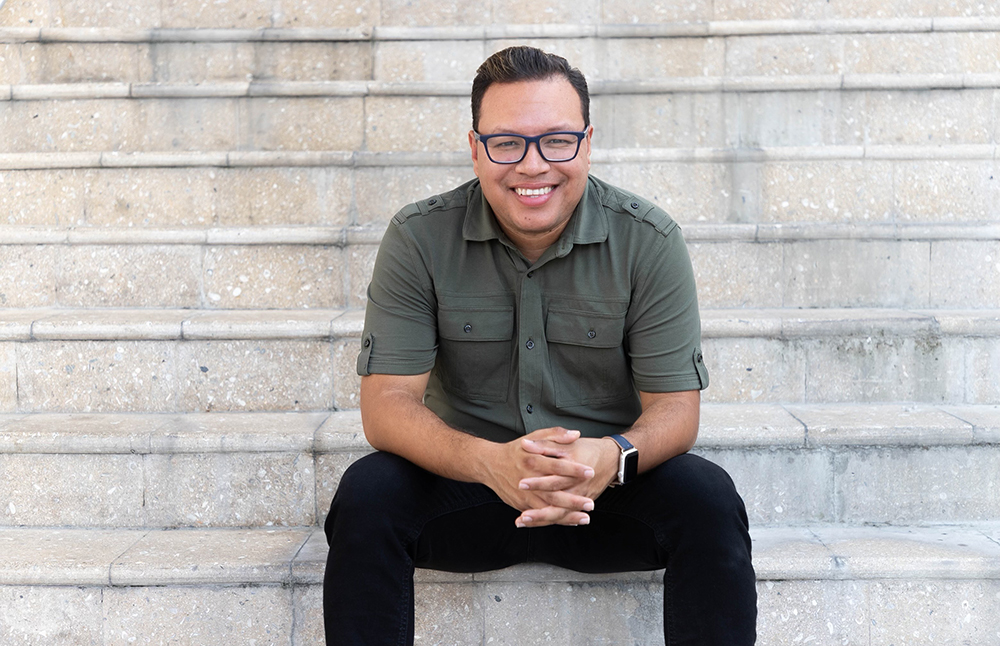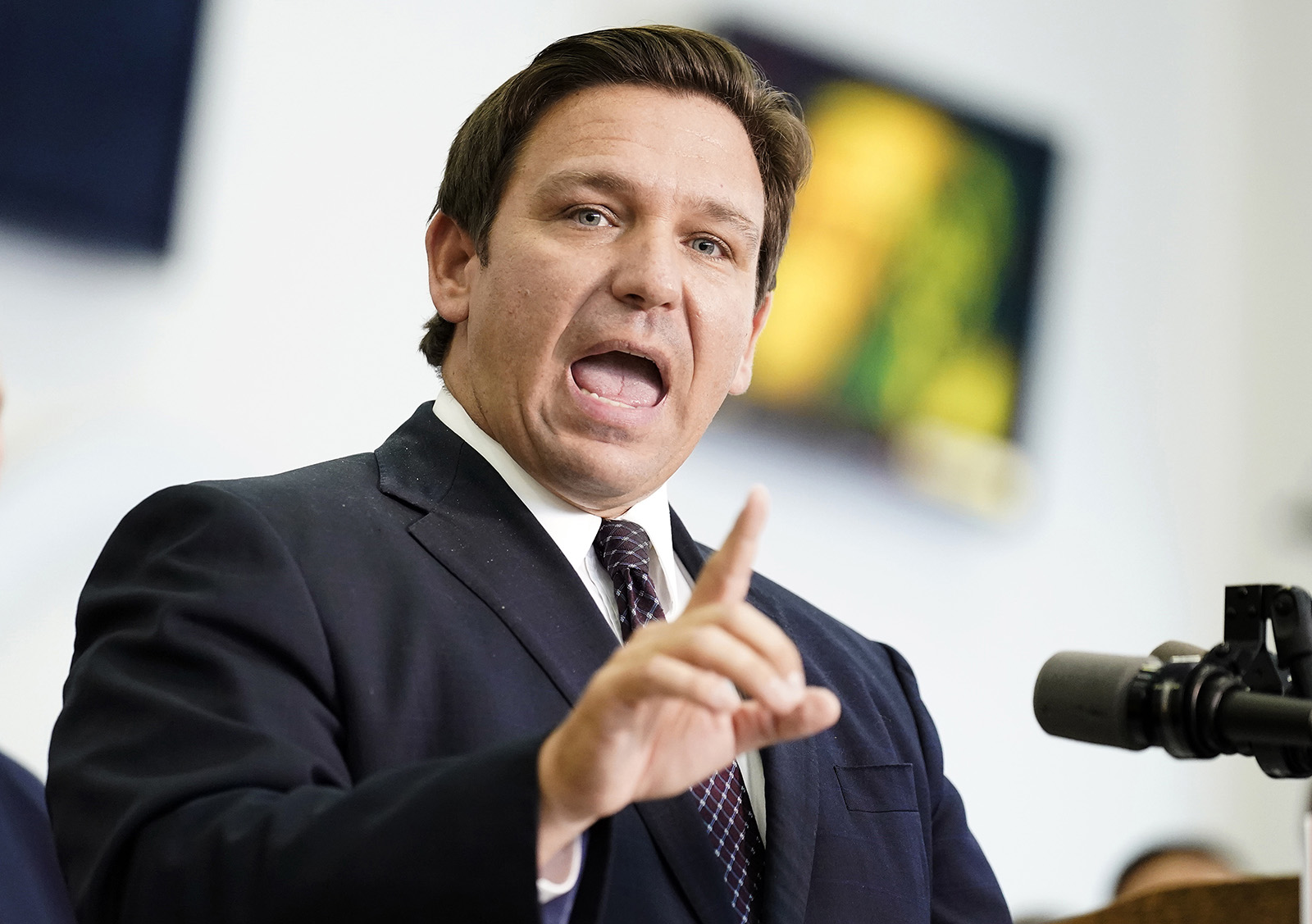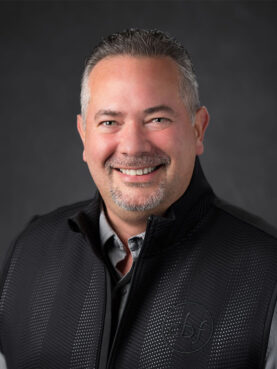
(RNS) — After Florida Gov. Ron DeSantis ordered state regulators to deny licenses or renewals to those sheltering unaccompanied migrant children, more than 200 faith leaders and evangelical pastors of Spanish-speaking churches made their way to downtown Tallahassee last year in February to protest the governor for preventing them from doing the “work that God has called us do.”
Many of those shelters were housed in local Latino evangelical churches, according to the faith leaders who also demonstrated against a law that now forbids state and local governments from contracting with transportation companies that knowingly bring undocumented immigrants.
Now, as DeSantis prepares for a possible 2024 presidential bid and as he’s unveiled an immigration package that seeks to impose stiffer penalties for Floridians who “knowingly transport, conceal, or harbor” unauthorized immigrants, some Latino evangelical leaders say they’re willing to break the law if it’s enacted and are mobilizing their flocks — this time in larger numbers — to “fight against DeSantis.”
As part of his immigration proposal, the governor wants to prohibit local governments from issuing ID cards to unauthorized immigrants, mandate hospitals to collect data on the immigration status of patients, reverse legislation granting out-of-state tuition waivers for eligible “Dreamers” and require all employers in Florida to use E-Verify to determine employment eligibility.
Under these proposals, some pastors fear they can get arrested simply for serving immigrant communities. Many churches provide food and shelter for those in need, which can include immigrants and unaccompanied immigrant children. Pastors often take ailing congregants to the hospital. Congregations travel to worship retreats and church vans frequently pick up and drop off church members.
“Allowing politics to interfere in the decision-making of congregations,” said Carlos Carbajal, who pastors an immigrant evangelical congregation in Miami, would be a “betrayal of the gospel.”
Carlos Carbajal. Courtesy photo
Though a relatively small demographic, Latino evangelicals are a fast-growing faith group in the United States and one that 2024 presidential campaigns will work hard to capture. However, many in the community caution that they are not easily swayed by traditional right-left arguments, even as more than half of Florida’s Latinos voted for DeSantis’ reelection last year.
To Agustin Quiles, a director of government affairs for the Florida Fellowship of Hispanic Bishops and Evangelical Institutions, which represents more than 2,500 churches and organizations across the state, DeSantis’ proposed immigration package “is the issue that is really going to wake up the Latino evangelical community.”
“Even though DeSantis uses some of our conservative values to gain the support of our community, when you touch the heart of our churches and the people that we love and care for … our pastors will not stand for this,” Quiles said.
Among those at risk, Quiles said, are “people that are faithful, that give tithings, that are supportive to the work of the church.” The governor is “making a big mistake and he should reconsider,” said Quiles, who is part of the “Evangélicos for Justice” campaign against the death penalty that called on DeSantis to stay the execution of Donald David Dillbeck. That campaign will now focus its efforts against the proposed immigration measures.
The Rev. Esteban Rodríguez, with Centro Cristiano Pan de Vida in Kissimmee, a city in central Florida just south of Orlando, said he’s willing to not only break the law if DeSantis’ immigration package takes effect, but also ready to stand up against it.
Rodríguez cited the biblical story of Pharaoh’s decree to kill newborn Hebrew boys in Egypt. He noted the midwives “who were wiling to break the law and that’s why they were able to save Moses.”

Florida Gov. Ron DeSantis speaks to supporters and members of the media after a bill signing on Nov. 18, 2021, in Brandon, Florida. (AP Photo/Chris O’Meara, File)
DeSantis’ proposed immigration measures “harm humanity” and “don’t align with what we preach,” said Rodríguez, who also serves as the secretary for the Florida Fellowship of Hispanic Bishops and Evangelical Institutions.
The faith community must serve the people, Rodríguez said, and screening congregants to see if they are immigrants or undocumented “would affect our way of serving the community.”
The Rev. Samuel Rodriguez, who serves as president of the National Hispanic Christian Leadership Conference, said “there is angst in the Latino evangelical community” over DeSantis’ immigration proposal.
“Every Latino pastor in the state of Florida, every Latino pastor who pastors a Spanish-speaking ministry, if I were a betting man, we have undocumented individuals in each of these churches, bar none,” he said. ”So are you saying that the same Latino pastors that are pro-life, pro-religious liberty, biblical justice, no to socialism and communism and yes to parental rights — that this leadership, that we are criminals?”
The pastor lauded DeSantis’ “outreach to the Hispanic evangelical community,” but said he is concerned about the third degree felony penalties for harboring someone who is undocumented as well as hospitals collecting immigration information. This doesn’t mean that Latino evangelicals favor President Joe Biden’s handling of immigration issues, he added.
Additionally, Samuel Rodriguez said he’s seeking a meeting with DeSantis to express their concerns with his current proposal. “We can say we want to stop illegal immigration, but we have to demonstrate some common sense compassion as it pertains to basic human services.”
Pastors David and Ada Rivera, who lead Iglesia de Dios Pentecostal in Tampa, Florida, were among those who protested in Tallahassee last year. Their church, with a membership of about 1,500, has served as a shelter for unaccompanied youth.
“We know that people come looking for a better way of life,” said David Rivera. “We want to help them. We don’t want them to fall in somebody else’s hands.”
The Riveras joined the Florida Immigrant Coalition as well as other business and multifaith leaders in issuing a statement condemning DeSantis’ “draconian measures.”
“The governor knows that the fastest growing church is the immigrant church. When he declares radical anti-immigrant mandates, he is declaring war against the church,” they said.

The Rev. Rubén Ortiz. Courtesy photo
For the Rev. Rubén Ortiz, who with his wife, Xiomara, pastors Comunidad Cristiana Nuevo Pacto, the governor’s proposed measures — if enacted — would mean they’d be “breaking the law from Day One.”
The governor “would be violating our rights, specifically in the case of us ’transporting or harboring’ immigrants,” said Ortiz, who is Cuban American.
“We open doors, offer shelter, pick up, hug, and live together with people whose immigration status is not an impediment,” Ortiz said.
Their congregation in DeLand, a suburb of Orlando, ranges between 50 and 70 people and is made up of members from Central America, Mexico, South America and islands of the Caribbean.
Ortiz, who also serves as the Latino field ministries director for the Cooperative Baptist Fellowship, said pastors will be raising their voices and challenging the governor’s immigration plans “in every way we can.” Churches, he said, employ people who cut their lawn and maintain their worship space without asking about their immigration status.
“We know that he (DeSantis) is trying to run for office as a candidate of the extreme right … and for that reason we are educating our people that he is a bad governor who is using our people for his own political tendency,” Ortiz said.
At Oikos, the Latino evangelical congregation that Carbajal pastors in Miami, there was a sense of indignation, frustration and fear among members as they discussed DeSantis’ immigration plans on Sunday.
“What’s going to happen if this goes through?” and “How is this going to directly affect us?” were among their questions, said Carbajal, whose congregation of between 20 to 40 people includes immigrants from Honduras, Nicaragua, Venezuela, Colombia and Peru.
As a pastor, Carbajal said it’s crucial to be informed on such policies, particularly because many of his congregants believe that immigration is solely a federal issue. They’re not fully aware of state measures and, on top of that, there’s a lot of misinformation among Christian communities, Carbajal said, adding that it’s part of his job to help inform them.
Carbajal said pastors must recognize that their position on immigration issues “does not come from our level of political understanding, but from our understanding of the gospel and biblical justice.”
“Any position that contradicts the gospel of welcoming and providing for the foreigner, we need to speak up and proclaim our opposition to it,” he said.

